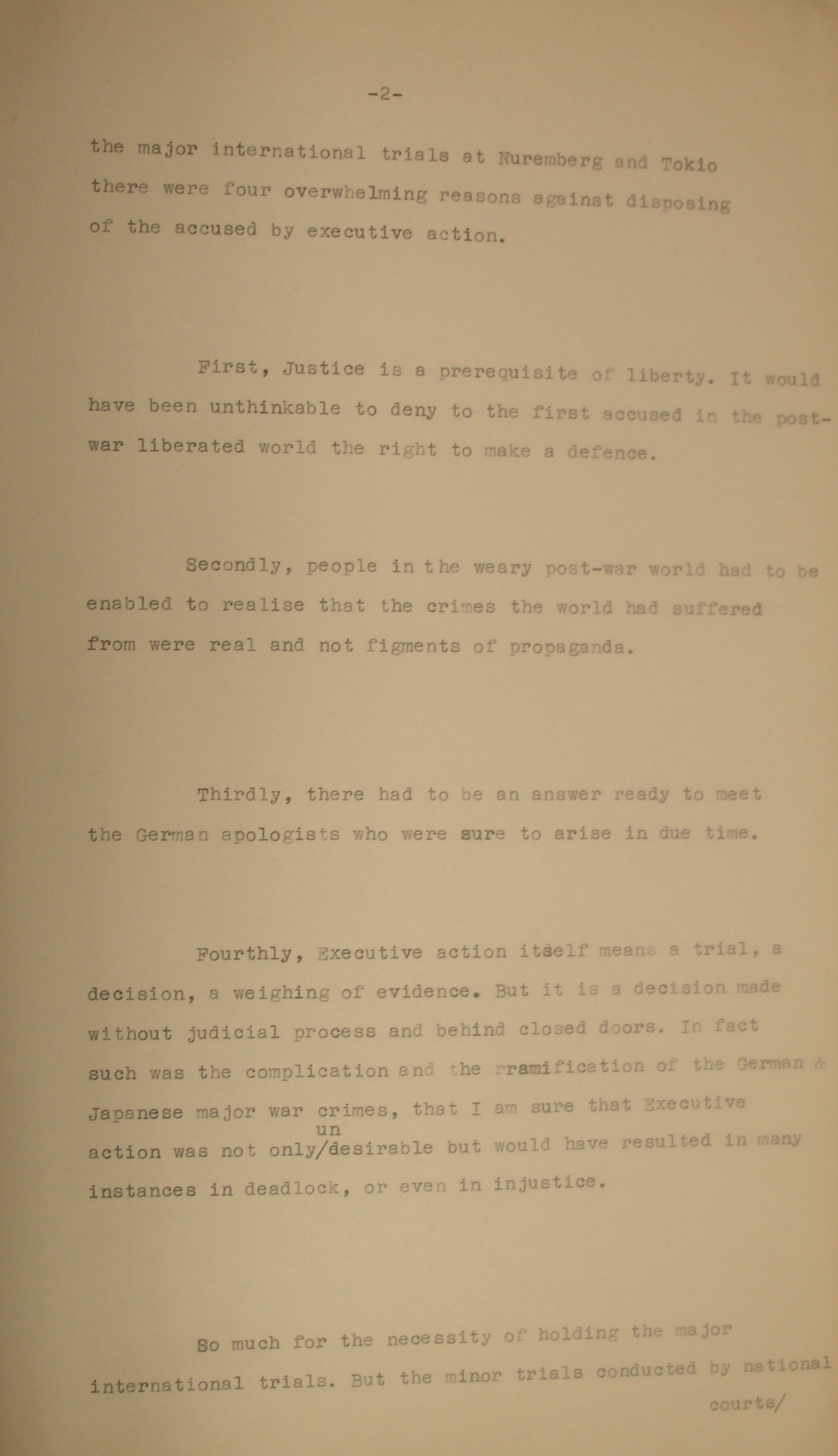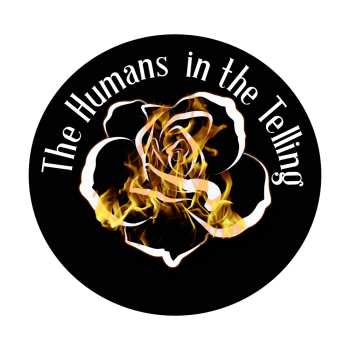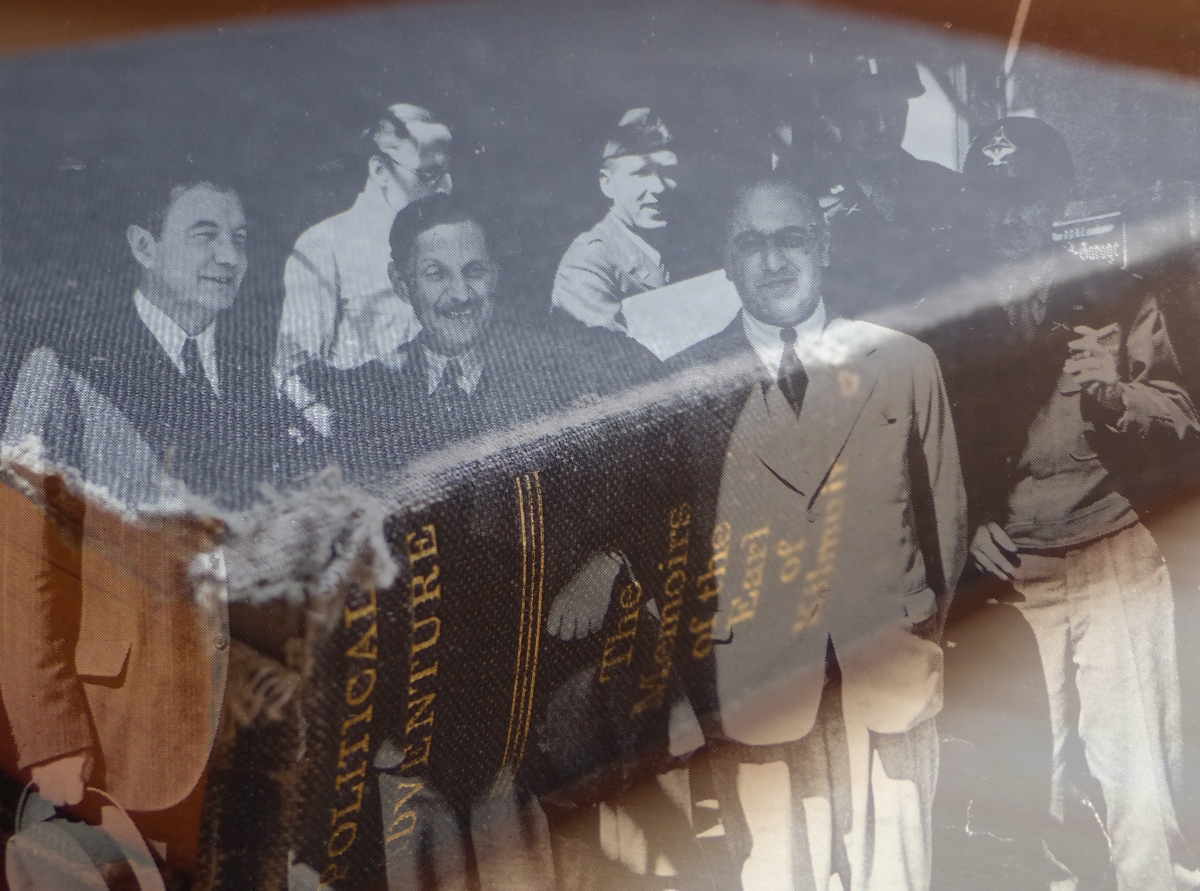As grandson of David Maxwell Fyfe, British prosecutor at Nuremberg Trials and champion of the European Convention on Human Rights, Tom Blackmore was asked to sign the declaration for Justice for Ukraine calling for an international tribunal to try President Putin for the crime of aggression.
In 1950 Maxwell Fyfe gave a speech describing the need to hold war criminals to account, and how that need springs from a universal understanding of right and wrong in natural law, now described as human rights. Read an excerpt below.
Most people approach the subject of War Crimes Trials fundamentally either as cynic or idealist. This is, I think, because in essence the case for or against trying war criminals depends on that controversial subject which has become succinctly known as human rights. Your cynic says, “Human Rights? There are none.”
Your idealist, however, takes the view that there are certain rights and freedoms not created by lawyers but to which mankind as such are heir and which cannot be alienated. It is a conception akin to the idea of the Law of Nature which had such a wide influence on relationship in past centuries, although now somewhat outmoded.
This idea of fundamental Human Rights is one in which I firmly believe. The difficulty of course is, as human law givers are not the creators but only the interpreters or codifiers of those fundamental rights, opinions differ widely as to their precise definitions. But to the cynic I would say that there is no real difficulty, for we know well enough for practical purposes when particular infringement has occurred. There is a saying attributed to a famous Lord Chief Justice of England (Russell) that the common law of England is known to be based on a few fundamental principles, but it is strange that nobody has satisfactorily explained what they are. Yet our Common Law is a very real thing, and its’ basic principles, whatever they are, have encircled the world.

When the war ended in 1945, the intention to punish war criminals was almost universally approved, even by those who did not believe in trying them, and (perhaps more remarkable) by those who did not believe in Human Rights as such. There was a blind instinctive desire for retribution.
Fortunately, moderate views prevailed, and the demand for executive action without trial was refused. As far as concerns the major international trials at Nuremberg and Tokyo there were four overwhelming reasons against disposing of the accused by executive action.
First, Justice is a prerequisite of Liberty. It would have been unthinkable to deny to the first accused in the post-war liberal world the right to make a defence.
Secondly, people in the weary post-war world had to be enabled to realise that the crimes the world had suffered from were real and not figments of propaganda.
Thirdly, there had to be an answer ready to meet the German apologists who were sure to arise in due time.
Fourthly, executive action itself means a trial, a decision, a weighing of evidence. But it is a decision made without judicial process and behind closed doors. In fact, such was the complication and the ramification of the German and Japanese major war crimes, that I am sure that Executive Action was not only undesirable, but would have resulted in many instances in deadlock, or even in injustice.

So much for the necessity of the holding the major international trials. But the minor trials conducted by national courts presented somewhat different problems. The significance of the trial in most of such cases was shifted from the general to the particular, but the enormity of the crimes judged from certain aspects were often greater than in the cases of the major war criminals themselves. For example Ohlendorf, whose extermination group gassed 90,000 people behind the German armies in the East. And Hoess, the Commandant of Auschwitz extermination camp, who presided over the gassing of two and a half million people. These, and many like them, had to be tried. But the line had to be drawn somewhere. I do not know how many war crimes trials the Allied nations have conducted, but the United States War Crimes Commission have received written records of over 1,600. Yet that figure is but a small proportion of the trials that could have been held if time and judicial resources had permitted. I suppose it is not an exaggeration, in view of the huge membership of the S.S. the Gestapo, and other criminal organisations, to estimate that in theory the number might have run into tens of thousands.
But time has called a halt, and time has called forth new sentiments.
For while even now there is little reluctance felt at the punishment meted out to the major war criminals, the lesser war criminals (though responsible perhaps for many deaths or much human misery) tend to become the objects of pity as time goes by and memories (in this country at least) grow fainter. There is a tendency to question the propriety of or morality of condemning people for crimes, which (who knows) the people of the victor nations might in the frailty of human nature have committed too in similar circumstances. Soldiers feel that the German generals only did their duty. Perhaps even judges may be tempted to feel that Nazi judges could not be blamed for enforcing Nazi laws. There is a feeling that we of the victor nations are exhibiting an unwarranted self-complacency, even arrogance, in condemning men who were perhaps the victims of circumstance, and the pawns in mass movements beyond their personal control.
It is a feeling of uneasiness mingled with resignation at the unfairness of fate. It is perhaps akin to the lament in AE Housman’s lines on the man about to be hanged,
In Shrewsbury gaol there sleeps tonight
Or wakes, as may betide
A better lad, if things went right,
Than most who sleep outside
A E Housman
‘If things went right.’ That is the tragedy of human life. We are not all faced with the choice between right and wrong action in quite so stark a way as the people of Nazi German were faced with it… We may do well to ask ourselves what course we as individuals would choose if we were faced with the alternatives that would have faced us as Germans under Hitler.
Many Germans chose the concentration camp, suffering and death. Many more chose to throw in their lot with the regime, some wholeheartedly, some as secret enemies or saboteurs. Those who took the latter course… played with fire…
What are we to say of a man who is required to issue orders which will result in the deaths of perhaps 100 people, and who decides to send out the orders in such a way as to cause the deaths of only 10 people? He knows that if he refuses he will be dismissed (perhaps liquidated) and the order will probably be issued by someone else in his stead. Has he committed a crime? Undoubtedly. Has he committed a moral or ethical wrong? To my mind he most assuredly has committed a moral or ethical wrong. One must not be misled by the good fact of his having saved 90 people into discounting the bad fact that he has murdered 10. Would it be any different if he saved only 10 but murdered 90? No. He has no right to murder any at all, whatever his motive.
These are ideal sentiments. But is it permissible to take any other standard in such matters? That most people will fall below that standard goes without saying, but that is a different question. Their fellow mortals may pass a more lenient judgement upon them if they have mitigated their wrongs with good intentions, but their moral guilt is unpardonable, for who can pardon a moral wrong?
Find out more about Justice for Ukraine and sign here.
Discover Maxwell Fyfe’s Nuremberg story at https://www.thehumansinthetelling.org/




